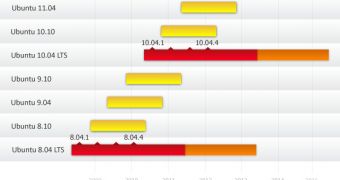In a recent post on his blog, Mark Shuttleworth, CEO at Canonical, has talked about synchronicity between Long Term Support releases from different Linux distributions. One of the arguments he brought to support this idea was that developers could focus more on the important role of component selection, integration, testing and patch management, instead of on the core component feature development.
Shuttleworth wrote that the next LTS release, Ubuntu 10.4 LTS, would be launched in April 2010, and thanked everyone who contributed to the current LTS, 8.04. Speaking of Hardy Heron, he said that this would be the first LTS to have a regular set of point releases (we will have 8.04.1, 8.04.2 and so on), scheduled to start a few months after Hardy Heron's launch and then set to be repeated at every six months until the release of Ubuntu 10.4.
At the end of one of his articles, he said: There's one thing that could convince me to change the date of the next Ubuntu LTS: the opportunity to collaborate with the other, large distributions on a coordinated major/minor release cycle. If two out of three of Red Hat (RHEL), Novell (SLES) and Debian are willing to agree in advance on a date to the nearest month, and thereby on a combination of kernel, compiler toolchain, GNOME/KDE, X and OpenOffice versions, and agree to a six-month and 2-3 year long term cycle, then I would happily realign Ubuntu's short and long-term cycles around that. I think the benefits of this sort of alignment to users, upstreams and the distributions themselves would be enormous."
Mark Shuttleworth has also shown real appreciation for the fact that the GNOME and KDE annual conferences (aKademy and GUADEC) will be held in the same place, at the same time, next year. In his own words, he considers this move "an important step towards even better collaboration".

 14 DAY TRIAL //
14 DAY TRIAL //